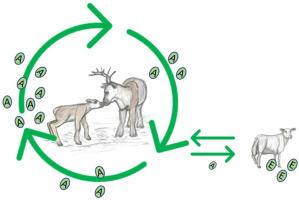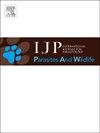挪威野生驯鹿和家养绵羊中的十二指肠贾第虫。
IF 2
3区 医学
Q3 ECOLOGY
International Journal for Parasitology-Parasites and Wildlife
Pub Date : 2024-10-14
DOI:10.1016/j.ijppaw.2024.101004
引用次数: 0
摘要
野生和半驯化驯鹿在挪威的天然牧场上自由吃草,经常与家养绵羊及其他家养和野生反刍动物共用牧场。这项研究从挪威南部的两个地区采集了野生驯鹿和家养绵羊的粪便样本,并对其进行了分析,以评估贾第虫的发生和聚集情况。在 162 份野生驯鹿样本中,有 25 份(15%)对贾第鞭毛虫呈阳性反应,显示出较高的感染强度,其中大部分样本属于 AI 亚群,具有人畜共患病的可能性。有趣的是,这项研究没有检测到已知存在于野生反刍动物中的 AIII 亚种。在 45 份羊样本中,有 13 份(29%)贾第鞭毛虫阳性,其中大部分属于 E 组合。由于这些天然牧场上的绵羊数量远远超过野生驯鹿,因此它们似乎并不共享贾第虫群,这一点很耐人寻味。本文章由计算机程序翻译,如有差异,请以英文原文为准。

Giardia duodenalis in sympatric wild reindeer and domestic sheep in Norway
Wild and semi-domesticated reindeer graze freely on natural pastures in Norway, often sharing these with domestic sheep and other domestic and wild ruminants. In this study, faecal samples from wild reindeer and domestic sheep were collected from two areas in southern Norway and analysed to assess the occurrence and assemblage of Giardia duodenalis. Among 162 wild reindeer samples, 25 (15%) were positive for Giardia, showing high infection intensities, with most of the samples belonging to sub-assemblage AI, which has zoonotic potential. Interestingly, this study did not detect subassemblage AIII, known to be found in wild ruminants. Among 45 sheep samples, 13 (29%) were Giardia-positive, with most belonging to assemblage E.
The finding of predominantly assemblage AI in the reindeer was surprising, particularly given the large proportion of sheep shedding assemblage E Giardia cysts. As the number of sheep on these natural pastures far outnumbers the wild reindeer, it is intriguing that they do not seem to share Giardia assemblages.
求助全文
通过发布文献求助,成功后即可免费获取论文全文。
去求助
来源期刊

International Journal for Parasitology-Parasites and Wildlife
Medicine-Infectious Diseases
CiteScore
3.80
自引率
5.60%
发文量
113
审稿时长
45 days
期刊介绍:
The International Journal for Parasitology: Parasites and Wildlife (IJP-PAW) publishes the results of original research on parasites of all wildlife, invertebrate and vertebrate. This includes free-ranging, wild populations, as well as captive wildlife, semi-domesticated species (e.g. reindeer) and farmed populations of recently domesticated or wild-captured species (e.g. cultured fishes). Articles on all aspects of wildlife parasitology are welcomed including taxonomy, biodiversity and distribution, ecology and epidemiology, population biology and host-parasite relationships. The impact of parasites on the health and conservation of wildlife is seen as an important area covered by the journal especially the potential role of environmental factors, for example climate. Also important to the journal is ''one health'' and the nature of interactions between wildlife, people and domestic animals, including disease emergence and zoonoses.
 求助内容:
求助内容: 应助结果提醒方式:
应助结果提醒方式:


